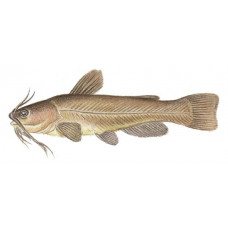Latin name
Ameiurus melas
Other names
Сatfish, black catfish, yellow belly bullhead, horned pout; French: barbotte noire.
Identification
The "black" bullhead can actually be yellowish green, dark green, olive, brown, or black on the back. Bronze or green on the flanks and bright yellow or white on the belly. The entire body has a luster. Only juveniles and spawning males are really black. The black bullhead can be distinguished from the brown or yellow bullhead by the posterior edge of the pectoral fin, which in the latter is serrated with numerous sharp, barbed protrusions. On the pectoral fin of the black bullhead they are much less pronounced, or may be absent altogether. The black bullhead has dark chin barbs, which may have black spots, a plump body, and a flattened tail.
Distribution
The black bullhead is found from southern Ontario west to Saskatchewan and throughout the Great Lakes, Hudson Bay, St. Lawrence River and Mississippi Basin, extending as far east as New York, the Gulf of Mexico to the south and Montana to the west. Introduced populations exist in Arizona, California and other states.
Habitat
Black bullhead inhabit bodies of water, backwaters, and slow-moving sections of streams and small and large rivers. They also inhabit reservoirs, dams, and ponds. They prefer muddy water and soft muddy bottoms and tolerate polluted water better than other catfish. Likewise, they prefer 75° to 85 °F water and avoid colder, clearer water.
Size
The black bullhead grows up to 241⁄2 inches in length, but most often it reaches 6–7 inches and rarely exceeds 2 pounds. The maximum lifespan of a black bullhead is about 10 years, although most live only 5 years. The world record is 7 pounds, 7 ounces.
Life history and Behavior
Spawning occurs in May, June and July, usually at water temperatures of 66° to 70 °F.
Food and feeding habits
Adults feed mainly at night, feeding on mollusks, snails, plant material, and fish.
Reproduction
In weedy areas, the female clears debris and silt to prepare her nest. Spawning occurs up to five times an hour, and each time the female releases about 200 eggs, fanning them in between spawnings. Both parents fan the eggs until they hatch and guard the fry, which leave the nest in compact groups.
| Classification | |
| Phylum | Chordata |
| Class | Actinopterygii |
| Squad | Siluriformes |
| Family | Ictaluridae |
| Genus | Ameiurus |
| Species | A. melas |
| Features | |
| Conservation status | Least Concern |
| Habitat | Bottom |
| Life span, years | 10 |
| Maximum body weight, kg | No information |
| Maximum length, cm | 60.96 |
| Sailing speed, m/s | No information |
| Threat to people | Edible |
| Way of eating | Predator |


